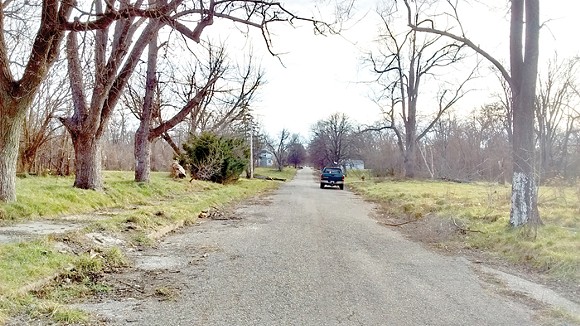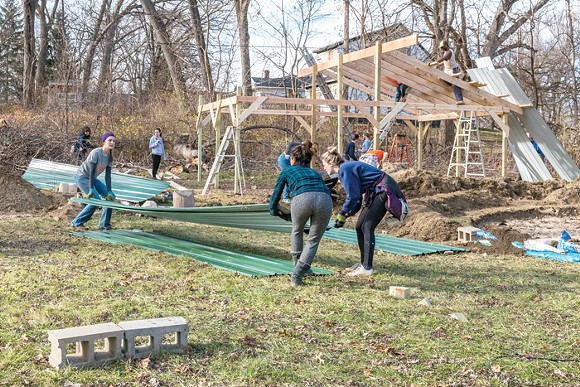It’s late afternoon on a chilly November night and Jonathan Pommerville is prowling the streets of Brightmoor as a one-man neighborhood patrol, something he’s spent about 100 hours doing over the last year.
He's lived in Brightmoor most of his life, and seems every bit the freewheeling working-class guy, down to his neck tattoos, his foot-long goatee, and the husky edge to his laugh. At 38, he's married and owns his own business, but hasn't lost his adventurous streak: He still enjoys getting away to the U.P. to ride dirt bikes.
That thrill-seeking spirit suits him, because he spends a couple hours a week in his battered truck, armed only with a video camera, playing cat-and-mouse with the drug buyers, hookers, johns, dumpers, and scrappers who plague his neighborhood.
"There aren't too many people who live in the neighborhood," he points out, "so either they're passing through, going to the drug house, coming from the drug house, dumping off junk in the neighborhood, or picking up hookers. So it's not hard for me to identify these folks, who they are."
For a year, he's posted videos of his confrontations with them to his YouTube channel — user name: fochnut — to shame those he says who treat his neighborhood as a playground or a dump site.
Today, for example, he rolls down the street and sees a white guy in a hoodie sitting in an older silver sedan slicked down with Bondo. "This is my 'buddy' right here," Pommerville says. "He always tells me, 'I live around here!' He's going to go pick up his dope here at this house. I won't stick around for it, but we'll follow him out of here."
As we drive by, the man does his best to ignore us, which makes Pommerville snicker. "He's got his eyes lasered forward!" he says with a laugh. "He doesn't like me. He brings in these older hookers and they'll get a couple rocks from that dealer there, and they'll go ahead to one of these other streets down here and smoke.
"And he's gotta blow into that fucking thing to start it. He's on probation. So when I catch up to him, it takes him a while for him to even start the car to get away. You can't even make this stuff up. It's just too funny."
When Pommerville's checks up on his "buddy" in a few minutes, he's slowly pulling away. "They can't wait to get smoking. He's smoking right now, I can guarantee it." Pommerville creeps along behind him. "See him? He's in so much of a hurry to get smoking that crack he'll drive 2 miles an hour around the neighborhood."
He follows him for a few lights up a main road. He pulls up almost alongside the man's car at a red light. The driver's eyes are locked on it. Pommerville pulls closer to point his camera at the man, who nearly bolts through the stoplight.
"You almost ran a red light there, buddy!" Pommerville cries with delight, laughing. The man yells something back. He doesn't look happy.
"Was that a threat?" Pommerville asks.
Whatever it was, it certainly wasn't a joyful greeting.
"I just want him to know that every time he comes into my neighborhood, it's going to be the same thing," he says. "The same thing."
Pommerville's quarry rolls the window down, and Pommerville holds out the video camera and asks, "Want to say anything for your compilation video?"
"Hey, what's the deal, dude? I live in the same neighborhood! What's the problem?"
Pommerville asks the man to pull over and talk with him. "I highly doubt he will. We'll give him that chance to do so." Apparently, a parley with Pommerville isn't something the man wants right now. He continues up the road, eyes "lasered" again.
"Maybe next time," Pommerville says.
'Blightmore'
Pommerville grew up in the neighborhood in the 1980s, when Brightmoor was going from a bastion of working-class whites to a crack-damaged neighborhood of poverty, crime, and blight. His family moved him outstate for several years when he was a boy, but he returned in his 20s. He never lost his fondness for the neighborhood's memories, and points them out as he drives around: the BMX course he and other kids built "with shovels and willpower" in a now-overgrown lot, the now-vacant Burt Elementary where he went to school and sang in the choir, the corner he grew up on, which has now reverted to urban meadow.
"It's almost a fucking sickness," Pommerville says. "People who grew up here really want to come back here. They're all around my age. It's almost psychopathic, how badly they want to be here. I love this neighborhood. I think that's the only reason I fight so hard for it. I want to see this neighborhood come back."
But even Pommerville admits that not all of it can come back. (The neighborhood earned the nickname "Blightmore" with good reason.) Driving down Chatham, he points out the only two families left on a block of otherwise burned-out, boarded-up, or stripped-down shells. "It's unbelievable," he says. "A lot of this will probably be turned over to a different type of land use."
But a drive down Blackstone affords the bleakest view of all. It might be mistaken for a country road, if not for the regularly planted trees that have grown into gnarled and uneven "widowmakers."
"Isn't this crazy?" Pommerville asks. "It's kind of like a bomb went off.
"This is what we get left with when we don't have home ownership. People aren't taking care of their properties. They use them until they can't use them anymore and toss them to the side. It winds up looking like somebody dropped a fucking bomb on this neighborhood because nobody's fought for it."
One way Pommerville fights for it is by boarding up vacants. With the help of volunteers and neighborhood kids, he's burned through almost 200 4-foot-square posterboards.
"We are trying to discourage people picking apart the homes that are still viable," he says. "The best way to do that is to go ahead and secure the homes. If it looks like no one is taking care of it, they are going to pick it completely apart."
Pommerville acknowledges that a reborn Brightmoor will look much different. "Let's see what we can do with this animal husbandry," he says. "What I think is going to happen quickly is there's going to be so much interest in animal husbandry, people will be moving here in droves just to do it. I really want people to see what me and others in the neighborhood see. There's plenty of space and opportunity here."
In fact, few neighborhoods are as well-suited to animals as Brightmoor. In addition to the supply of vacant land, the area's parks and the way the Rouge River winds through have drawn a hardy and growing crowd of DIY gardeners and urban farmers who keep chickens, ducks, and more. That's helped lay the groundwork for innovative land uses, and even now the city is deciding which neighborhoods will allow agricultural animals.
Detroit's District 1 manager for Brightmoor, Stephanie Young, says that Neighbors Building Brightmoor has already completed a door-to-door survey, and a majority of residents approve of the idea. Young says of the canvassers, "To their own surprise, people were interested in horses! They were thinking about rabbits and chickens and the occasional goat, and there were people interested in horse stables and dressage training! They had no idea they'd get that far."
Humpers and dopers
In addition to blight, Brightmoor's disinvestment has attracted what sociologists might call a vibrant "informal economy." Part of that is one of the things that annoys Pommerville most: the prostitutes and johns scurrying through the neighborhood's sidestreets.
"Usually, the weekends are pretty good," Pommerville says. "They start early. On the weekends, you'll see hookers in cars, and the car will be driving by your house at 2 miles per hour, and you'll see their heads bobbing up and down, in the middle of the day, while the kids are out playing on the streets."
Then there are the neighborhood's drug dealers and trap houses. Pommerville hassles the drug-addled losers who pick up prostitutes, but tries to be civil with the dope boys, and shuns the ones who cause trouble.
"It's a different kind of rules around here, you know?" he says. "As long as you're not impeding on other people. I'll show you some of the houses that are selling dope. They're all intertwined. They all know who I am. A lot of them like what I'm doing in here. But I'd love to see something going on where we get rid of them."
If the illegal activity is quiet and out of view, Pommerville feels he has more pressing problems to tackle, but sometimes he has to act.
He says, "One of the dope boys down the street, a bigger guy, he comes down in front of my house and sold some drugs right in front of my fuckin' house. I went right out there and I'm like, 'You know, I'd just prefer you didn't do that out in front of my house.' He looks at me and goes, 'I'm so sorry, sir. It won't happen again.' And he's never been back. He always waves at me. And I didn't have to go out there and act like a fuckin' jackass to him, you know? I just treated him like a neighbor.
That's the essence of Pommerville's style. He'll approach people with a camera, a civil tone, and a big, shit-eating grin. He says he's almost never armed.
"If you see my gun it's the last thing you're going to see," Pommerville says. "I don't necessarily carry it all the time, but I know when to go get it. You need to act with civility. I want to treat people like I want to be treated. The last thing I want to do is escalate a situation. Guns are the last thing I want to do."
'A throwaway society'
Then there's the way illegal dumpers use Brightmoor as a drop zone, which drives Pommerville nuts. People dump bags of trash, contractor waste, abandoned vehicles, trailers, boats, even dead bodies: Abreeya Brown, 18, and Ashley Conaway, 22, of Hamtramck, were found buried in shallow graves in a wooded area four years ago, gagged, bound, and shot in the head.
Pommerville brings his truck to a stop on a hard-hit block of Chatham near a classic dumping scene: a pile of broken furniture and contractor's trash bags strewn over the driveway of a vacant home. It looks as though a pickup truck backed into the driveway, and the refuse was hurriedly pushed out onto the ground. He puts on a pair of gloves and gets down to work, pawing through the trash.
He's no scrapper, but he'll do a bit of scavenging as he picks through other people's trash. "I find all kinds of good materials that I can use for boarding up houses," he says. "The city does a very good job of providing stuff for us, but we try to reuse what we can. As fast as we can board this stuff up, we need more."
Pommerville digs through rubbish that includes several cellphones, a cigarette case, necklaces, billfolds, a Wii controller still in the plastic bag, a stash of Beanie Babies, and an ashtray from Dave & Buster's. He finds some stuff worth keeping: a good pair of jumper cables, a new lockout set, and a brand-new glue gun. He also finds somebody's stack of porn DVDs, including such titles as Black Heat in Lust and Just Legal Black Schoolgirls. "This is a lot more normal than you would think," he says about the porn.
What he's looking for are mail pieces, bills, order forms, anything with an address. Often, people dumping are in too big a hurry to cover their tracks, and Pommerville finally strikes pay dirt: Several pieces of mail for a resident living on Schaefer Highway in Detroit a few miles from here.
"A lot of times," he says, "these are cleanouts of other homes. They just throw everything away. Usually, they're paid to dump this somewhere. And this is not what they were paid to do. But the best part is, it's easy to track down these people, because there's usually mail. They're not too discerning about what they keep and what they throw away."
Taking stock of the situation, he says, "Well, guess what? We got a 'return to sender' here. I'm going to take this to the address. That's how easy this stuff is. They're in such a hurry to dump this stuff off quickly, they forget the first rule: You shouldn't be throwing out junk that has your address on it."
Pommerville grabs his video camera again and points out a "highly suspicious" car parked on a side street. He drives up and rolls down his window just in time to see a man toss a cup down, and then pick it up.
"Hey, I appreciate you went and picked that up," he says. "I'm the one that usually ends up picking that stuff off the ground."
"We didn't throw anything on the ground," somebody in the car says.
"I just seen him do it. It was on my video."
"A cup?"
"Yes, sir, that was that cup that he threw out there."
"I didn't see it."
"That your property?" a male passenger asks.
An impatient tone creeps into Pommerville's voice: "No it's not. ... It is my neighborhood."
He briefly explains what he does, and adds, "I just appreciate if you went and picked up the garbage, so I don't have to do it. Can you agree with that?"
The man in the car doesn't agree. He says, "I think you better get that camera out of my face before I take your shit and break it."
"I highly doubt that's gonna happen," Pommerville says.
The woman in the driver's seat says, "Sorry about that. Have a good night."
"Thank you for being civil. Thank you, sir!" then Pommerville turns to his camera and reads off the car's license plate, just loudly enough for the man to hear. "Huh?" the man says.
"I was just repeating your license plate. Have a good day, sir. Thank you for picking up the cup."
Pommerville snickers as he drives away. "He didn't like me too much."
Well, it was just a cup.
"Even just that little bit is disrespectful," Pommerville says. "It's only fair. Look: There's not a stitch of garbage out there, and yet they decide that that's the place for it to go. People just treat this neighborhood like it's a freakin' garbage can. It's a cultural issue. It's a throwaway society. The mentality has to change."
'I know the secret'
One thing you seldom hear Pommerville complain about is the city, or things like police response times. "We don't beat that dead dog," he says with a smile.
He adds that some things have improved over the last year. Using the city's mobile app, he's seen problems solved in just a few days. "The city has come ahead leaps and bounds compared to what they used to be like," he says, "because there's a huge spotlight on this area."
Pommerville is responsible for some of that attention. He has only been patrolling the hood for a year, but it has gotten him and Brightmoor a good amount of publicity. He started out confronting people using his cellphone as a video camera for protection. (He says, "The most dastardly people can turn into the most civil people in the world when they're being videotaped.")
He says it was the brazenness of the criminal activity that spurred him into action. "What really bothers me is, they'll come in here and pick up their drugs, and they'll just toss stuff right out their window in front of your house. There's all kinds of homes all over that you can see are absolutely abandoned. And they'll sit in front of my house and throw condoms and smoking stems right on my grass? I'm like, you guys are fucking morons. Of course I'm going to chase you!"
Pommerville posted some of the videos online, and that led to a segment with WWJ's Charlie Langton. Pommerville says, "Charlie told me, 'Listen: Something's gotta happen with your videos, 'cause you're all shaky.'"
Since then, Pommerville bought a handy little camera for $200 and has posted dozens of videos to his YouTube channel. In many of them, he gets a big reaction out of the people he surprises, including prostitutes in mid-bob. In a harrowing video titled "Not on My Street," a man in a work van almost rams Pommerville's truck. In another series of shorts, a dumper gets his truck stuck in mud trying to flee, and absconds with the vehicle's plates before the cops arrive.
Those arresting clips got journalists calling. In fact, with the help of WXYZ's Ronnie Dahl, he's been able to break stories on television, which does bring help from the authorities in a hurry.
"I can bitch about it and bitch about it but it's not going to get them out here," he says. "And there's no reason to bitch about when I know the secret. I know how to get them out here. Call Ronnie Dahl. Get involved. Put a YouTube channel out there. The city is paying attention to those kinds of things. They don't like any kind of negative publicity."
Who's Ted Nugent?
It's now well after dark, and Pommerville sees some curious activity in front of Ted Nugent's childhood home at 23251 Florence St. It's a white box truck creeping up onto the sidewalk. Pommerville takes the license plate number and drives on by, circling the block slowly, hoping to catch them in the act.
"That's an MO of a picker crew," he says. "What they'll do is, they'll go inside that house, they'll start stripping it apart from the inside, and then they'll scavenge it completely. What we'll let them do is let them get nice and settled in."
When he brings his truck back around the corner a few minutes later, a man and woman are standing near the truck. Pommerville says, "I think he wants to talk to me."
"How's it going, guys?" Pommerville asks.
"Hey, how you doing?"
"Not too bad."
"Are you recording?" the woman asks.
"Oh, I record everybody."
"What's going on?" the man asks.
"We're getting a lot of scrappers that are coming through here. People picking the places apart."
"Oh, you can take my license plate number," the man says. "Yeah, this is ... uh ... my house right here."
"That's your home? OK. You know, that used to be Ted Nugent's house. That was his childhood home."
"Huh? Who?"
"Ted Nugent," Pommerville repeats.
"Who's that?"
"The Motor City Madman!" Pommerville says, thumping the steering wheel. "Ted Nugent!" The man and woman stare at him.
"So you just ride around and record?" the woman asks.
"I record everything, everybody. I catch hookers, people dumping, and people picking off the houses."
The man and woman relax a bit and share more information. Their story evolves a bit. The house is going into foreclosure. "But we still got time before we get out," the man says. "I let my sister stay here. I'm getting ready to move my niece to stay here. She wanted me to move her couch. Yeah, that's what I'm doing."
Pommerville says goodnight and rolls up the window to drive off. He laughs and says, "They're so full of fuckin' shit. ... I'm pretty sure he's there to clean out the house. It's all right. If I have any issues, I have his information. I don't think he will be doing anything today, just because of that."
From blight to beauty
Pommerville drives up to what's left of Burt Elementary, the elementary school he attended. "Now it looks like we've got people tearing it apart," he says. "It's unbelievable. Every time I go past this school, how much it reminds me of my childhood. The back door is wide open. And this is all scrappers. Nowhere in the world, other than Detroit, can you see this kind of scene."
While Pommerville talks, neighbor Velma Jones pulls into her driveway across the street from the tall, weedy grass in front of the school. Jones has lived in the neighborhood for 36 years, and her own daughter and grandchildren went to school there.
"I'd been calling and calling to get that school boarded up," she says. "It was literally open for five years. They just boarded it up this year. They've been breaking back in. They do it at night. My fear is that I've seen children on top of the roof.
"I'd watched them night after night raid the school," she says. "I used to call the police, and if they did come, it was too late. They took the fence, piece by piece. They'd take enough to know to get gone before the police come."
Jones remembers a time when things were different. "It was beautiful," she recalls. "You wouldn't believe how beautiful it was. The lawns were immaculate. They couldn't stand for a weed to get in the grass. I'd never seen anything like it. But, over the years ... My daughter has been robbed twice. So now we call when we get home. My sister's in there. She probably didn't hear me."
Her phone goes off. It's her sister warning her that there are men outside the house. It just so happens they're the ones she's speaking with.
Showing just what a small world the Brightmoor area is, at this moment John George, the head of Motor City Blight Busters, drives by and recognizes Pommerville. He pulls over and gets out to chat.
George is eager to share the big things he's involved in. The Fisher Foundation just donated $500,000 to the city for demolition. Another company kicked in an additional $100,000. The donors took one additional, unusual step: They asked what residents wanted demolished.
George and others helped come up with a plan to demolish the abandoned houses around Samuel Gompers Elementary-Middle School. "Yesterday at noon," George says, "the first house came down. And we're going to be demolishing an additional 25 homes, working with the mayor and Councilmember James Tate. It was really the first time we sat down with a neighborhood, a funder, and the city, and we got to pick the target. We're hoping other foundations will follow that lead."
Coming to community
George and his Motor City Blight Busters are a force to be reckoned with, but they're just one group among several. Within just a few square miles comprising Brightmoor, Riverdale, and Old Redford are an estimated dozen community groups trying to help in one way or another. Pommerville is choosy about which ones he'll assist. He only joins forces with those he feels are listening to the locals.
"I'm from the neighborhood," he says, "where there are a lot of people coming in and pushing their will on us. They are doing stuff to us rather than involving us completely. It's off-putting to a lot of residents who have been here for a long time. We stuck through the really bad years and what's really got me is to hear about how much money that has gone through this little Brightmoor area."
"That's the only problem I have with a lot of these cats that are moving in," he says. "They're cliquish. I'm not interested in all that hippie shit, but if you want to get your hands dirty, and you want to work and help out a neighbor, I'm there."
That said, there are many local groups and leaders Pommerville assists, among them Riet Schumack's Neighbors Building Brightmoor. Schumack not only has a hoop house, but teaches children how to grow vegetables and bring them to market. Nearby, the Brightmoor Artisans Cooperative is opening a kitchen and community center where the people in the neighborhood can sell local honey, which Pommerville says is excellent in Brightmoor.
Other neighborhood folks are adorning the landscape with inventive art projects. Pommerville hopes that, one day, the people who used to bring cameras to Brightmoor to photograph ruin porn will return for the installations. Driving around, he points out a fanciful lot filled with toy cars, a glass-and-steel sculpture set into a garage door, murals, an ornamental gate decorated with tile, and more. It's a neat trick: Somebody doesn't have to be living in a house to add some life to it.
The latest project is an ambitious one. It's going in at Dolphin and Grove. It's called Groundhog Park, named for the critter that lives nearby. On this bright Saturday afternoon, a gaggle of students and neighborhood volunteers are hard at work, Pommerville among them. They truck wheelbarrows back and forth, and hammers bang as the picnic shed is put together.
Leading the students is associate professor Joe Trumpey, who teaches a class on designing and building food systems at the University of Michigan. After taking tours of several farms, his students were fired up to design a food-centered project, but found that what the residents really wanted was a lively gathering place.
The outcome was Groundhog Park, a space with a "pizza garden" growing basil, oregano, peppers, and tomatoes, and a pizza oven shaped like a groundhog. A sand play area, zip line, and swings appeal to the kids. And a fire pit provides a warm center that extends the season.
Trumpey says giving residents designs they want is vital. "This way, the community owns it," he says. "If this place is going to be used, people need to believe in it and understand that it's about them, not us.
It's a sentiment Pommerville agrees with. "This isn't any company coming out. This is volunteers and people who live in the neighborhood. There's nobody else doing this stuff for us. The city's not going to do it. We have to do it."
All afternoon, people keep pouring in to pitch in on the big task. Pommerville looks happy and proud to be involved. He hints that this is the sort of thing he'll probably be doing more of, though the shaming videos have helped throw a light on his corner of Detroit.
In fact, Ronnie Dahl soon arrives, with a cameraman in tow, and sets about getting the story, this time a good one. And that's thanks to none other than Jonathan Pommerville, who now enjoys a bit of that notoriety that helps get things done.
"I go to Home Depot or our local store and people go, 'You're that guy!'" he says.
"'Yup, I'm that guy.' I already know what they're talking about."










